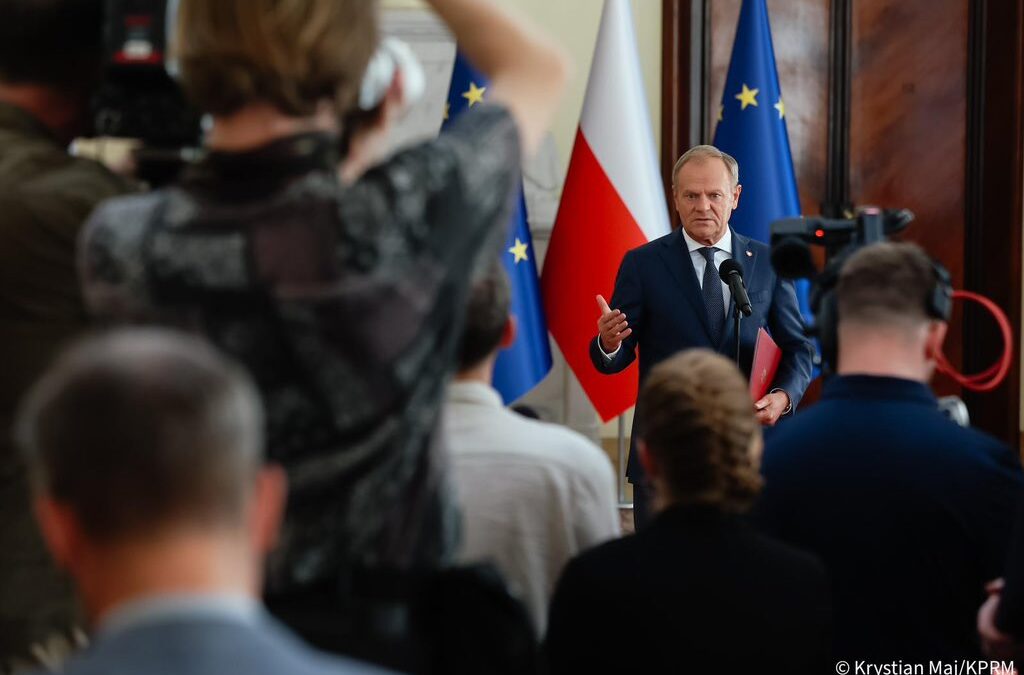Poland’s prime minister, Donald Tusk, has established a commission tasked with investigating Russian and Belarusian influence in Poland in the period 2004 to 2024.
The decision comes amid heightened concerns over the threat Poland is facing from its eastern neighbours. During yesterday’s press conference announcing the new commission, Tusk revealed that it is “likely” Russia was behind a recent fire that destroyed Warsaw’s largest shopping centre.
However, the main opposition party, Law and Justice (PiS), argues that the new commission is not intended to genuinely investigate Russian influence. It says that it is actually Tusk and others around him who have in the past cooperated with Russia.
It is “likely” that Russia was involved in the fire that recently destroyed Warsaw’s largest shopping centre, says Polish Prime Minister Donald Tusk.
However, he added that investigations are still ongoing https://t.co/SipJtSLIpQ
— Notes from Poland 🇵🇱 (@notesfrompoland) May 21, 2024
On Tuesday afternoon, Tusk announced that he had signed an order creating the commission and that, on the recommendation of justice minister Adam Bodnar, he had appointed as its chairman General Jarosław Stróżyk, the head of the Military Counterintelligence Service (SKW).
The remaining members of the commission will be recommended by the ministers of the interior, culture, finance, foreign affairs, defence, state assets and digital affairs.
Tusk noted that the commission would not have the power to call witnesses for questioning but would instead “analyse documents, analyse the media”.
“The commission will act discreetly,” said Tusk. “There will be no media hearings, there will be no media [present] during the work of this committee…[to ensure it can] work free from the unbearable burden of speculation and guesswork in public life.”
Premier @DonaldTusk podczas konferencji prasowej w #KPRM: Wydałem zarządzenie w sprawie powołania komisji ds. zbadania wpływów rosyjskich i białoruskich. Na przewodniczącego, szefa tej komisji, na wniosek @MS_GOV_PL @Adbodnar, powołujemy szefa służby Kontrwywiadu Wojskowego pana… pic.twitter.com/nbdnzk4Y4q
— Kancelaria Premiera (@PremierRP) May 21, 2024
“However, we will systematically inform about the effects of its work,” added the prime minister, noting that the first partial report from the commission would be available in around two months. “The result of the work of this committee will most likely be notifications to the prosecutor’s office.”
Tusk denied that the commission would be used politically to target the opposition. The prime minister and his Civic Platform (PO) party have regularly accused PiS of acting in Russia’s interest.
“The commission, which is to investigate possible Russian influences on Polish politics in recent years, is not aimed at any confrontation with the opposition,” said Tusk in an interview with broadcaster TVN on Monday.
“I am not at all interested in the party colours. We are concerned with eliminating a threat that is here and now, today and tomorrow,” he added.
Poland has announced additional funding for its security agencies due to the growing threat of Russian covert actions.
"Attempts at direct action, including sabotage and attempted arson, have been thwarted" in recent weeks, says @donaldtusk https://t.co/yNu6bD3q1N
— Notes from Poland 🇵🇱 (@notesfrompoland) May 14, 2024
At the same time, however, Tusk specifically named PiS deputy leader and former defence minister Antoni Macierewicz as a person of interest in such an investigation.
He accused Macierewicz of “dramatically weakening the defence capabilities of the Polish state” and “introducing into the most sensitive places people who never hid their clearly pro-Russian sympathies”.
“The noose of information we are collecting is tightening around Antoni Macierewicz. It is truly ghastly that this man had such an influence on what was happening in Poland,” said Tusk. “There are several people [around Macierewicz] whose actions were clearly political sabotage.”
A court has ordered Antoni Macierewicz, deputy leader of opposition party PiS, to apologise to @donaldtusk and two of his ministers, @sikorskiradek and @TomaszSiemoniak, for accusing them of “hiding the perpetrators” of the 2010 Smolensk plane crash https://t.co/6p0VmlhV0o
— Notes from Poland 🇵🇱 (@notesfrompoland) February 2, 2024
In response, Macierewicz told broadcaster TV Republika that it was in fact Tusk and people around him who had cooperated with Russia and had continued the policies of Poland’s former communist regime.
PiS chairman Jarosław Kaczyński likewise said that the aim of Tusk’s new commission is not to genuinely investigate Russian influence but to divert attention away from the fact that it was Tusk and those around him who have “cooperated with Russia against Poland”.
Kaczyński said that he would support the establishment of such a commission “if the main suspect is the prime minister”.
Even a leading figure from one of Tusk’s coalition partners – Michał Gramatyka of the Poland 2050 (Polska 2050) party – yesterday expressed scepticism about the commission, describing it as an “unnecessary political project”, reports Dziennik Gazeta Prawna.
Kaczyński wprost: Jeżeli przed komisją ds. badania wpływów rosyjskich głównym podejrzanym będzie premier Tusk, to jej powołanie będzie dobrym krokiem#włączprawdę #TVRepublika
— Telewizja Republika 🇵🇱 #włączprawdę (@RepublikaTV) May 15, 2024
Last year, PiS, when it was still in power, also set up a commission to investigate Russian influence in Poland. The body was given extensive powers, including the ability to ban people from holding office, leading to fears it would be used for political purposes against the then opposition.
Those powers were watered down after criticism from the EU and US. In November, the commission issued a report recommending that leading opposition politicians, including Donald Tusk, not be allowed to hold positions responsible for state security. Tusk took office as prime minister the following month.

Notes from Poland is run by a small editorial team and published by an independent, non-profit foundation that is funded through donations from our readers. We cannot do what we do without your support.
Main image credit: Kancelaria Premiera / flickr.com (under CC BY-NC-ND 2.0 DEED)

Daniel Tilles is editor-in-chief of Notes from Poland. He has written on Polish affairs for a wide range of publications, including Foreign Policy, POLITICO Europe, EUobserver and Dziennik Gazeta Prawna.



















